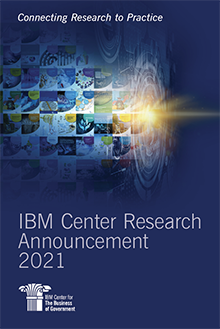
New Research Report Recipients

We are pleased to announce our latest round of new reports on key public sector challenges, which respond to priorities identified in the Center's research agenda. Our content is intended to stimulate and accelerate the production of practical research that benefits public sector leaders and managers.
We expect the following reports to be published starting in the fall of 2022. Short summaries of each report follow:
The Adaptive Government - Preparing for "Business as Disrupted” -- by Nicholas Evans, British Computer Society
This report will provide government executives and managers with insights and recommendations to accelerate their digital transformation and prepare for the future in light of continuous disruption. Now the rule, rather than the exception, disruption is a continuous force affecting governments, businesses and society on a daily basis due to ever-increasing waves of technological change, climate change, societal upheaval, pandemics and natural disasters. The report will provide practical insights and actionable recommendations for accelerating digital transformation to prepare for "business as disrupted." Not just building a digitally-transformed organization, but an adaptive government with intrinsic agility so it can respond to continuous disruption.
Entrepreneurial Agility: Lessons from the US Air Force: Broadening Innovation and Empowering Innovators -- by Norris Krueger, American University
2018’s National Defense Strategy directed military services to intensify their innovation efforts and broaden participation. The USAF developed AFWERX, a powerful initiative to broaden procurement of dual-use innovations, increase quality and impact of innovations, increase diversity and inclusion, reduce unfair incumbency advantages, speed up processes, and save money. This report will identify the key mechanisms of AFWERX’s efforts and how they can (and cannot) be applied in other public sector settings.
Measurements & Metrics: Determining the Alignment and Effectiveness of Outcomes from State Uses of Federal Recovery Funds in Transformational Events -- by Karen Kunz, West Virginia University and Scott Pattison, University of Ottawa
Diverse states have used federal recovery funds to replenish lost revenue, address negative economic impacts, and improve program outcomes, reflecting the extraordinary impacts of the COVID-19 pandemic. This report will ascertain ways in which a shock to the system of this magnitude impacts governments’ ability to use emergency dollars for public services, and how states can use future recovery funds to help fulfill those missions. The report will examine the cases of three states - Florida, Illinois, and Colorado - to explore how the alignment and effectiveness of funded activities are measured, and to identify lessons to guide states in their deployment of resources in future transformational events.
Identity: New Technologies and Enablers for Government -- by Andrew Whitford, University of Georgia
Government sits at the center of a central challenge for the next two decades: how to create and manage identities in digital settings. Both firms and governments require technologies and enablers for implementing systems that navigate three challenges: first, each person needs a way to prove they are who they say they are; second, each person desires a level of privacy about that identity; third, each person wants an amount of security about that identity – and the uses for that identity in terms of obtaining benefits and rights. This report will document such technologies and enablers.
Department of Defense Planning, Programming, Budgeting, and Execution System Reform -- by John Whitley, Institute for Defense Analysis
The National Defense Authorization Act directs a commission to reform the Defense Department's (DoD) Planning, Programming, Budgeting, and Execution (PPBE) system.This report will provide specific challenges currently experienced with the PPBE system, actionable recommendations for PPBE reform, and lessons learned from DoD's resource management experience for civilian agencies.
Trust in Government Forums -- by Ed DeSeve, Coordinator, Agile Government Center (AGC) and Visiting Fellow, IBM Center for The Business of Government
The Center is facilitating a series of forums on trust in government with the National Academy of Public Administration's AGC. Topics for discussion will include: defining and measuring trust in government, agile regulation, and involving customers and the public in implementing regulations, policies and programs. A final report will be released summarizing these discussions with government, academe, and nonprofit organizations.



